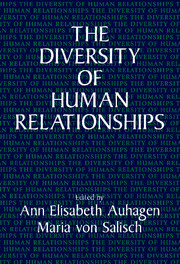Book contents
- Frontmatter
- Contents
- List of contributors
- Acknowledgments
- Introduction
- I Foundations
- 1 Describing relationships
- 2 The development of diverse social relationships in the social world of childhood
- 3 Relationships between children: Symmetry and asymmetry among peers, friends, and siblings
- II Relationships within the family
- III Partnerships
- IV Private nonkin relationships
- V Relationships at work
- Epilogue
- Author index
- Subject index
1 - Describing relationships
Published online by Cambridge University Press: 20 May 2010
- Frontmatter
- Contents
- List of contributors
- Acknowledgments
- Introduction
- I Foundations
- 1 Describing relationships
- 2 The development of diverse social relationships in the social world of childhood
- 3 Relationships between children: Symmetry and asymmetry among peers, friends, and siblings
- II Relationships within the family
- III Partnerships
- IV Private nonkin relationships
- V Relationships at work
- Epilogue
- Author index
- Subject index
Summary
Introduction
Can there be a science of relationships?
For nearly all of us, relationships are the most important part of our lives. Early development depends on an adequate relationship with a caregiver. Subsequently, relationships with other family members, with peers, with teachers, shape the developing personality. In preadolescence, close relationships with peers, and especially with opposite-sex peers, become important, and remain so throughout life. An adequate network of personal relationships forms an important protection against psychological and physical ill health.
Not surprisingly, perhaps, we all think we know about relationships. Indeed, we have been learning about relationships since we were born, and there are reasons for thinking that we are adapted to learning about relationships quickly and to using our knowledge with skill. Furthermore, every culture has its own folk psychology about which relationships are desirable and how relationships should be managed. Such folk psychology is all very well, but its beliefs can be based on wishful thinking by those who want to rationalize their own behavior or manipulate others to their own advantage. Or it can provide contradictory conclusions – for instance that similarity and difference each provides a basis for interpersonal attraction.
What we must work toward, therefore, is a science – used here in the sense of an ordered body of knowledge – of interpersonal relationships. We need to formulate each piece of knowledge about interpersonal relationships in a manner that will enable it to be incorporated alongside others, and thus to contribute to the edifice of knowledge.
- Type
- Chapter
- Information
- The Diversity of Human Relationships , pp. 7 - 35Publisher: Cambridge University PressPrint publication year: 1996
- 15
- Cited by



